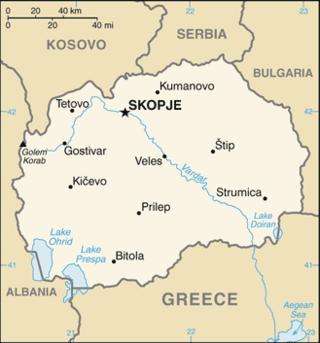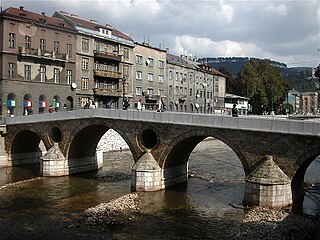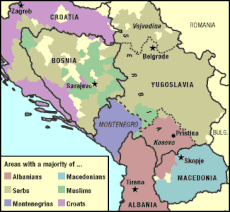
United Nations Security Council resolution 1244, adopted on 10 June 1999, after recalling resolutions 1160 (1998), 1199 (1998), 1203 (1998) and 1239 (1999), authorised an international civil and military presence in the Federal Republic of Yugoslavia and established the United Nations Interim Administration Mission in Kosovo (UNMIK). It followed an agreement by Yugoslav President Slobodan Milošević to terms proposed by President of Finland Martti Ahtisaari and former Prime Minister of Russia Viktor Chernomyrdin on 8 June, involving withdrawal of all Yugoslav state forces from Kosovo.
The United Nations Preventive Deployment Force (UNPREDEP) was established on 31 March 1995 in Security Council Resolution 983 to replace the United Nations Protection Force (UNPROFOR) in the Republic of Macedonia. The mandate of UNPREDEP remained essentially the same: to monitor and report any developments in the border areas which could undermine confidence and stability in the country and threaten its territory. It is widely considered to be an instance of a successful deployment of UN peacekeeping forces in the prevention of conflict and violence against civilians. The operation was shut down on 28 February 1999, after its last extension in Resolution 1186 when China vetoed its renewal in 1999 following Macedonia's diplomatic recognition of Taiwan. This mission was unique as it was the first peacekeeping operation to undertake conflict prevention before the outbreak of conflict. The premature termination of UNPREDEP in 1999 predates the 2001 insurgency in Macedonia.

United Nations Security Council resolution 795, adopted on 11 December 1992, after expressing concern about possible developments which could undermine confidence and stability in the Republic of Macedonia and welcoming the Organization for Security and Co-operation in Europe (OSCE) mission in Macedonia, the Council recalled Chapter VIII of the United Nations Charter and authorised the Secretary-General Boutros Boutros-Ghali to deploy a presence of the United Nations Protection Force (UNPROFOR) in the border areas of Macedonia.
United Nations Security Council resolution 983, adopted unanimously on 31 March 1995, after recalling Resolution 795 (1992) on Macedonia, the Council expressed concern about threats to the stability of the country and established the United Nations Preventive Deployment Force (UNPREDEP) by renaming the United Nations Protection Force (UNPROFOR) unit in the country for a period ending 30 November 1995.

United Nations Security Council resolution 1027 was adopted unanimously on 30 November 1995. This occurred after recalling previous resolutions including Resolution 983 (1995) on Macedonia. The Council extended the mandate of the United Nations Preventive Deployment Force (UNPREDEP) until 30 May 1996.

United Nations Security Council resolution 1046, adopted unanimously on 13 February 1996, after recalling previous resolutions including Resolution 1027 (1995) on the extension of the United Nations Preventive Deployment Force (UNPREDEP) until 30 May 1996, the Council authorised an increase in strength of UNPREDEP of an additional 50 military personnel for support in its operations.

United Nations Security Council resolution 1058, adopted on 30 May 1996, after recalling previous resolutions including resolutions 1027 (1995) and 1046 (1996), the Council extended the mandate of the United Nations Preventive Deployment Force (UNPREDEP) in Macedonia until 30 November 1996.

United Nations Security Council resolution 1082, adopted unanimously on 27 November 1996, after recalling previous resolutions including 1046 (1996) and 1058 (1996), the Council extended the mandate of the United Nations Preventive Deployment Force (UNPREDEP) in Macedonia until 31 May 1997 and reduced its size.
United Nations Security Council resolution 1105, adopted unanimously on 9 April 1997, after recalling Resolution 1082 (1996), the Council decided to suspend reduction of the military component of the United Nations Preventive Deployment Force (UNPREDEP) in Macedonia until the end of its current mandate, until 31 May 1997.

United Nations Security Council resolution 1110, adopted unanimously on 28 May 1997, after recalling resolutions 1082 (1996) and 1105 (1997), the Council renewed the mandate of the United Nations Preventive Deployment Force (UNPREDEP) in Macedonia until 30 November 1997.

United Nations Security Council resolution 1140, adopted unanimously on 28 November 1997, after recalling resolutions 1110 (1997), the Council renewed the mandate of the United Nations Preventive Deployment Force (UNPREDEP) in Macedonia for four days until 4 December 1997, pending further discussions. Resolution 1142 (1997) later extended UNPREDEP until 31 August 1998.

United Nations Security Council resolution 1142, adopted unanimously on 4 December 1997, after recalling resolutions 1105 (1997) and 1110 (1997), the Council extended the mandate of the United Nations Preventive Deployment Force (UNPREDEP) in Macedonia until 31 August 1998.
United Nations Security Council resolution 1145, adopted unanimously on 19 December 1997, after noting the termination of the mandate of the United Nations Transitional Authority for Eastern Slavonia, Baranja and Western Sirmium on 15 January 1998 in accordance with Resolution 1120 (1997), the Council authorised a support group of 180 civilian police monitors, known as the United Nations Civilian Police Support Group (UNPSG), to observe the situation in eastern Croatia for an additional nine months.

United Nations Security Council resolution 1160, adopted on 31 March 1998, after noting the situation in Kosovo, the council, acting under Chapter VII of the United Nations Charter, imposed an arms embargo and economic sanctions on the Federal Republic of Yugoslavia, hoping to end the use of excessive force by the government.

United Nations Security Council resolution 1174, adopted unanimously on 15 June 1998, after recalling resolutions 1031 (1995), 1035 (1995), 1088 (1996), 1103 (1997), 1107 (1997), 1144 (1997) and 1168 (1998), the Council extended the mandate of the United Nations Mission in Bosnia and Herzegovina (UNMIBH) for a period terminating on 21 June 1999 and authorised states participating in the NATO led Stabilisation Force (SFOR) to continue to do so for a further twelve months.

United Nations Security Council resolution 1199, adopted on 23 September 1998, after recalling Resolution 1160 (1998), the Council demanded that the Albanian and Yugoslav parties in Kosovo end hostilities and observe a ceasefire.

United Nations Security Council resolution 1203, adopted on 24 October 1998, after recalling resolutions 1160 (1998) and 1199 (1998) on Kosovo, the Council demanded that the Federal Republic of Yugoslavia comply with previous Security Council resolutions and co-operate with the NATO and Organization for Security and Co-operation in Europe (OSCE) verification missions in Kosovo.

United Nations Security Council resolution 1239, adopted on 14 May 1999, after recalling resolutions 1160 (1998), 1199 (1998) and 1203 (1998), the Council called for access for the United Nations and other humanitarian personnel operating in Kosovo to other parts of the Federal Republic of Yugoslavia.

United Nations Security Council resolution 1345, adopted unanimously on 21 March 2001, after reaffirming resolutions 1160 (1998), 1199 (1998), 1203 (2000), 1239 (1999) and 1244 (1999) on the situation in the former Yugoslavia, the council condemned extremist violence and terrorist activities in parts of Macedonia and southern Serbia and called upon Kosovo Albanian leaders to condemn the violence.

United Nations Security Council Resolution S/1999/201 was proposed on February 25, 1999, on whether to send a reserve intervention force to Macedonia. China used its veto to boycott in retaliation for Macedonia's establishment of diplomatic relations with Taiwan, and the case failed.
















